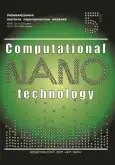Mathematical Model for Assessing the Performance Characteristics of Medical Information and Measuring Systems
- Authors: Dvoretsky A.G.1, Vytovtov K.A.2, Barabanova E.A.2
-
Affiliations:
- MIREA – Russian Technological University
- Institute of Management Problems named after V.A. Trapeznikov Russian Academy of Sciences
- Issue: Vol 11, No 5 (2024)
- Pages: 133-141
- Section: INFORMATICS AND INFORMATION PROCESSING
- URL: https://journal-vniispk.ru/2313-223X/article/view/284859
- DOI: https://doi.org/10.33693/2313-223X-2024-11-5-133-141
- EDN: https://elibrary.ru/CCBXYK
- ID: 284859
Cite item
Abstract
The work is devoted to the development of a mathematical model for the evaluation of non-stationary performance characteristics of medical information-measuring systems used in medicine to assess the condition of patients in critical health and life situations. The model is a unilinear mass service system with a finite queue, Poisson input flow and impatient requests, adequately describing the functioning of real-time medical systems including under conditions of equipment malfunctions and failures. The paper presents a system of Kolmogorov differential equations describing the mass service system under study, as well as its solution based on the method of probability transformation matrix. Expressions for finding the probabilities of the system states at an arbitrary moment of time are obtained, as well as non-stationary characteristics of the system performance, such as loss probability, throughput, and transient time. The results of numerical calculations are presented for a system with a buffer size equal to two packets at different ratios of the intensity of leaving impatient requests from the queue and service intensity.
About the authors
Artur G. Dvoretsky
MIREA – Russian Technological University
Author for correspondence.
Email: dvoretsky@sumirea.ru
ORCID iD: 0009-0001-5437-1371
postgraduate student, Department of Industrial Programming, Institute of Advanced Technologies and Industrial Programming
Russian Federation, MoscowKonstantin A. Vytovtov
Institute of Management Problems named after V.A. Trapeznikov Russian Academy of Sciences
Email: vytovtov_konstan@mail.ru
ORCID iD: 0000-0002-0359-9317
Scopus Author ID: 6603298537
ResearcherId: HKN-7218-2023
Dr. Sci. (Eng.), Professor; leading researcher, Laboratory No. 69
Russian Federation, MoscowElizaveta A. Barabanova
Institute of Management Problems named after V.A. Trapeznikov Russian Academy of Sciences
Email: elizavetaalexb@yandex.ru
ORCID iD: 0000-0003-4372-2946
Scopus Author ID: 56367430200
ResearcherId: F-1095-2017
Dr. Sci. (Eng.), Professor; leading researcher, Laboratory No. 69
Russian Federation, MoscowReferences
- Monakov D.M., Altunin D.V. Medical information systems: modern realities and prospects. Russian Journal of Telemedicine and Electronic Health. 2022. No. 8 (4). Pp. 46–53. (In Rus.). doi: 10.29188/2712-9217-2022-8-4-46-53.
- Oppedizano M.G.L., Artyukh L.Yu. The role of medical information systems in the organization of the healthcare system. FORCIPE. 2022. No. 4. (In Rus.)
- Bogdanova A.V., Blum V.S. Medical information system for early detection of defects in the provision of medical care. UECS. 2016. No. 12 (94). (In Rus.)
- Ansokova M.A., Rozanov I.A., Marchenkova L.A. Modern approaches to the use of digital technologies for rehabilitation and remote monitoring of patients with post-COVID syndrome. Bulletin of Restorative Medicine. 2023. No. 1. (In Rus.)
- Namazova-Baranova L.S., Suvorov R.E., Smirnov I.V. et al. Patient risk management based on remote health monitoring technologies: State of the field and prospects. Bulletin of the Russian Academy of Medical Sciences. 2015. No. 1. (In Rus.)
- Kalid N., Zaidan A.A., Zaidan B.B. et al. Based on real time remote health monitoring systems: A new approach for prioritization “Large Scales Data” patients with chronic heart diseases using body sensors and communication technology. J. Med. Syst. 2018. No. 42. P. 69. doi: 10.1007/s10916-018-0916-7.
- Zakharov A.I., Zagainov A.I. Implementation of a software package for calculating fractal parameters of complex systems. Intelligent Technologies in Transport. 2015. No. 2. (In Rus.)
- Eremushkin M.A., Knyazeva T.A., Malakhova E.V., Makarova O.G. Application of technology for remote monitoring of patients’ health in medical rehabilitation programs. Bulletin of Restorative Medicine. 2022. No. 6. (In Rus.)
- Vytovtov K.A., Barabanova E.A. Transient mode of operation of an optical switch with duplication of switching elements in an information-measuring system with traffic surges. Sensors and Systems. 2023. No. 6 (272). Pp. 34–39. (In Rus.)
- Osipov G.S. Queuing systems with limited waiting duration. Bulletin of Science and Practice. 2016. No. 12 (13). (In Rus.)
- Rubino G. Transient analysis of Markovian queueing systems: A survey with focus on closed forms and uniformization. In: Queueing theory 2: Advanced trends. Wiley-ISTE, 2021. Pp. 269–307.
- Kovalev I.A., Satin Ya.A., Zeifman A.I. Estimates of the speed of convergence and stability for one class of non-stationary Markov models of systems with impatient clients. Systems and Means of Information. 2022. Vol. 32. Issue 4. Pp. 21–31. (In Rus.)
- Matalytsky M.A., Kopat D.Y. Analysis in transient mode of a network with impatient positive and negative requests of various types. Bulletin of Tomsk State Unuversity. Management, Computing and Information Science. 2018. No. 42. (In Rus.)
- Ryzhikov Y.I., Ulanov A.V. Calculation of a hyper-exponential servicing system m/n 2/n-n 2 with requests impatient in the queue. Bulletin of Tomsk State Unuversity. Management, Computing and Information Science. 2014. No. 2 (27). (In Rus.)
- Ryzhikov Yu.I., Ulanov A.V. Simulation of queuing systems with impatient customers. In: Processing of 6th Russian conference “Simulation. Theory and Practice”. Kazan, 2013. Pp. 339–342. (In Rus.)
- Vishnevsky V., Vytovtov K., Barabanova E., Semenova O. Transient Behavior of the MAP/M/1/N. Queuing System Mathematics. 2021. No. 9. P. 2559. doi: 10.3390/math9202559.
- Vytovtov K.A., Barabanova E.A. Analytical method for analyzing inhomogeneous continuous Markov processes with piecewise constant transition intensities. Automation and Telemechanics. 2021. No. 12. Pp. 90–104. (In Rus.). doi: 10.31857/S0005231021120060. EDN: LLBBAY.
- Barabanova E.A., Vytovtov K.A. Analytical method for studying the behavior of a queuing system with abruptly changing information flows. Physical Foundations of Instrument Making. 2021. Vol. 10. No. 1 (39). Pp. 36–47. (In Rus.). doi: 10.25210/jfop-2101-036047. EDN: SWSDTE.
- Busarev M.I., Kirpichnikov A.P., Flax D.B. Single-channel queuing system with a limited average residence time of a request in the system as a whole. Bulletin of the Kazan Technological University. 2011. No. 22. (In Rus.)
- Barabanova E., Vytovtov K., Vishnevsky V., Khafizov I. Analysis of functioning photonic switches in next-generation networks using queueing theory and simulation modeling. Communications in Computer and Information Science. 2023. Vol. 1748. Pp. 356–369. (In Rus.)
Supplementary files








